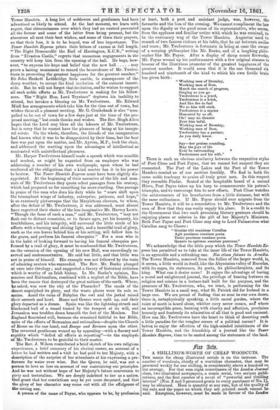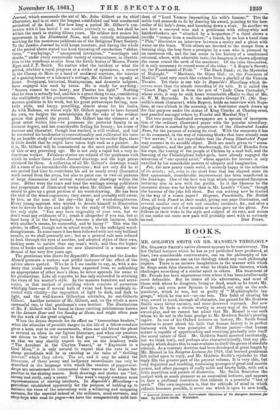lira arts.
A SHILLING'S-WORTH OF CHEAP WOODCUTS.
Tn-a mania for cheap illustrated serials is on the increase. The number of woodcuts, chiefly of a worthless character, that may be procured weekly for one shilling, is considerably above a hundred on the average. For that sum eight miscellanies of the London Journal class, two illustrated newSpapers, a comic serial, two serious publi- cations, and the first number of a novel of "powerful and thrilling interest" (Nos. 2 and 3 presented gratis to every purchaser of No.1), may be obtained. Here is quantity at any rate, but of the quality of the cuts and the paper on which they are printed much cannot be said. Exception, however, must be made in favour of the London Journal, which commands the aid of Mr. John Gilbert as its chief illustrator, and is at once the longest established and best conducted periodical of its kind. For how long a period Mr. Gilbert's con- nexion with it has lasted I am unable precisely to say, but shall he within the mark in stating fifteen years. He seldom now makes his appearance in the Illustrated News, and has entirely relinquished working for the numerous publications of the Religious Tract Society. To the .London Journal he still keeps constant, and during the whole of the period above stated has been throwing off numberless " abduc- tions," waylayings," "unexpected intrusions," "marriages and deaths," under every conceivable variety of circumstance, in illustra- tion to the wondrous stories from the fertile brains of Messrs. Pierce Egan and J. F. Smith. No matter what the incident or what the period, whether a royal progress or a strike of operatives, a review in the Champ de Mars or a band of mediaeval warriors, the interior of a gaming-hmise or a labourer's cottage, Mr. Gilbert is equally at home. Scriptural, historical, Shakspearian, and domestic subjects, have engaged him each by turns. He is ready for anything : "Seneca cannot be too heavy, nor Plautus too light." Nothing that he does is actually bad, and this is a great thing to say, considering, the multiplicity of his productions. Objection may be taken to nu- merous qualities in his work, but his great picturesque feeling, mas- terly style, and happy pencilling, almost atone for his faults. As with Rubens, on whose style Mr. Gilbert appears to have formed his own, we forgive the eccentricities for the sake of the evident genius that guided the pencil. Mr. Gilbert has the elements of a great artist within him—he possesses the pictorial faculty in an eminent degree, and has considerable feeling for beauty ; his sense of humour and character, though less marked, is still evident, and had be corrected his tendencies to conventionality and cultivated his taste by an humble study of unsophisticated nature in his earlier days, there is little doubt that he might have taken high rank as a painter. As it is, Mr. Gilbert will be remembered as the most prolific illustrator of this or any preceding age. He is not only a rapid but a very in. dustrious worker. Fabulous stories are related of the quickness with which be makes these London Journal drawings and the high prices obtained fortheni. A. collection of all Mr. Gilbert's drawings would fill a room of no inconsiderable dimensions ; end not only did he at one period find time to contribute his aid to nearly every illustrated work issued from the press, but also to paint one or two oil pictures of large dimensions and several water-colour drawings within the year. Bitter were the tears and loud the wailings among publishers and proprietors of illustrated works when Mr. Gilbert finally deter- mined to give up a great portion of his wood-drawing. He has been the idol of the wood-engravers ; they swore, and probably still swear, by him, as the man of the day—the king of wood-draughtsmen. Every young aspirant who wished to devote himself to illustration was to devote his days and nights to the study of Gilbert, his was the only style. "You may have originality of your own, but we don't want any evidences of it ; crush it altogether if you can, but at least keep it in the background ; become a slavish imitator, trade with another's means, be successful, and be happy !" This was the advice, in effect, though not in actual words, to the unfledged wood- draughtsman. In some cases it has been followed with not very brilliant results, as we shall presently see ; but as a general rule men refused to look through the eyes of another, and adopted styles of their own, looking more to nature than any man's work, and thus the higher class of books and periodicals are now illustrated in a manner un- dreamt of but very few years ago. The gentleman who draws for Reynolds's Miscellany and the London Herald presents a curious and pitiful instance of the effect of the i advice above quoted. Who he is I am unable to say, as, with a mo- desty that could scarcely have been expected from so unblushing an appropriator of other men's ideas, he never appends his name to his productions. Like all copyists, he has only succeeded in attaining the vices of his master's style. In the massive furniture and acces- sories, in that method of pencilling which consists of numerous whirligig lines—as if several balls of twine had been suddenly in- vested with vitality—the opposition of light to dark, and dark to light, and the well-known Gilbertian attitudes, he out-Gilberts Gilbert. Another imitator of Mr. Gilbert, and, on the whole a more successful one, is that gentleman's own brother. The illustrations of Mr. F. Gilbert will be found in those exciting publications known as the Leisure Hour and the Sunday at Home, and might often pass for the work of the great original. When the drama depends for its effect on " tremendous headers," when the stimulus of possible danger to the life of a fellow-creature gives a keen zest to our amusements, when our old friend the ghost is revived so often in our lighter literature, and when our painters are driven to their wits' end to find good "sensation" subjects, so that we may shortly expect to see on the Academy wall.; " The Accident in the Clayton Tunnel," or " Explosion in a Coal Mine," it is only natural to expect that the cuts in our cheap periodicals will be as exciting as the tales of " thrilling interest" which they adorn. The art, and it may be added the literature, of these penny and halfpenny miscellanies can only be described in the language with which the vendors of peppermint- drops are accustomed to recommend their wares on the frozen Ser- pentine in the skating season. Both drawings and stories are "hot, strong and curly, only a penny." This week's supply contains some representations of moving incidents, In Reynolds's Miscellany—a periodical established apparently for the purpose of holding up to derision the vices of the aristocracy with a withering and unsparing sarcasm, for the especial behoof of the milliners, maid-servants, and shop-boys who read its pages—we have the comparatively mild inci- dent of "Lord Vernon impeaching his wife's honour." This the noble lord proceeds to do by drawing his sword, pointing to the lace- collar of his lady's dress, and knocking down a chair. In another we see how a one-eyed man and a gentleman with riding-whip and knickerbockers are " attacked by a leopardess ;" a third shows a terrific "escape from a madhouse ;" a fourth, by no less a hand than "Plus," illustrates an interview between a sentry and a ghost with water on the brain. While others are devoted to the escape from a burning ship, the leap from a precipice by a man who is pursued by an enormous elk, and the last scene in the history of a condemned criminal, where, with admirable taste, the hangman is shown adjusting the noose round the neck of the murderer. Of the tales themselves, it is only necessary to record some of the titles: " A Rogue's Secret ; or, the Punishment of Pride." "The Black Band ; or, the Mysteries of Midnight." " Maritana, the Gipsy Girl; or, the Poisoners of Madrid," read very much like extracts from a playbill of the Victoria Theatre. Yet there is one tale in Reynolds's Miscellany which de- serves more than the simple recording of its title. It is called the "Court Page," and is from the pen of "Lady Clara Cavendish," whose style, it may be said, bears remarkable affinity to that of Mr. G. W. M. Reynolds. In it the unfortunate George IV. (Mr. Itey. nolds's stock character), while Regent, holds an interview with Napo- leon, at two o'clock in the morning, in a four-horse coach drawn up for that purpose under the statue of King Charles at Charing-cross, and guarded amongst othersby Fouchi and Marshal Ney The two penny illustrated newspapers are a species of incorpora- tion of the ordinary illustrated paper with the popular miscellany. One of them is started by the proprietors of the Illustrated London News, for the purpose of ruining its rival. With the resources it has at its command, in the way of reissuing blocks that have already seen "hot service," it is not improbable that the Penny Illustrated Paper may succeed in its amiable object. Both are much given to "sensa- tion" subjects, and the gale at Scarborough, the fall of Blondin from his rope, the tossing of the people at Chelsea by a mad bull, and the burning of the Philadelphian ballet-girls, have already engaged the attention of " our special artist," whose appetite for horrors is only excelled by his remarkable powers of ubiquity and imagination. Fun, the new penny comic serial, is scarcely happy in the selection of its artists; yet, even in the short time that has elapsed since its first appearance, considerable improvement has been manifested in the drawings. One of the best was that which represented Spurgeon lecturing arm in arm with the gorilla. In it the likeness to the eccentric divine was far better than in Mr. Leech's " Cure," though the humour of the joke fell short. But can nothing new be started in the way of a comic paper? Diogenes, Punchinello, The British Lion, all took Punch as their model, giving one page illustration, and several smaller ones of cab and omnibus incidents, &c., and after a struggling career of a few months or weeks gave up the ghost. Fun follows in their wake in the style and subject of its cuts, and unless it can strike out some new path will probably meet with as untimely































 Previous page
Previous page